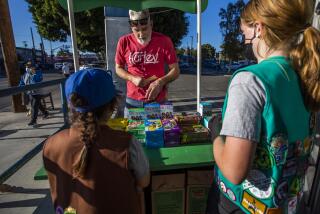Scouts to Check Backgrounds of New Volunteers
- Share via
WASHINGTON — The Boy Scouts of America will require criminal background checks of all potential volunteers to screen out those convicted of violent crimes, drug offenses or sexual abuse of children, the national organization’s executive council said Wednesday.
The decision comes after a series of recent child abuse cases involving adult volunteers and Scouts that prompted concerned parents to demand better protection for their children, Boy Scout officials said.
The move is part of a national trend to demand more accountability from organizations that function in parental roles.
Some of the nation’s largest youth sports groups, such as the California-based American Youth Soccer Organization and California Youth Soccer Assn., as well as the YMCA of Metropolitan Los Angeles, are among the organizations that already have instituted fingerprint checks for volunteers and employees.
“It started a long time ago, but the dramatic growth has come very recently,” said Tom DeCair, spokesman for the Josephson Institute of Ethics in Marina del Rey, which has urged all youth organizations to require background checks for coaches. The move started after harrowing abuse allegations surfaced at day-care facilities in the 1980s.
Background checks “can’t be a bad idea,” he added. “If you’re reluctant to do it, maybe you shouldn’t be around kids.”
But relying on background checks is an incomplete protection, said Larry Rosen, president and chief executive of the YMCA of Metropolitan Los Angeles. To begin with, the checks turn up only those who have a criminal record.
Perhaps more important, in the vast majority of reported child sexual molestation cases, the abuser is a family member, other relative or neighbor, he said.
The U.S. Department of Health and Human Services says that 88% of reported sexual abuse cases were perpetrated by parents or other relatives of victims, and only 2% by adults in other care-taking relationships.
. “The people who you should look at are family, relatives and people in the neighborhood,” Rosen said. Nonetheless, parents increasingly are demanding background checks from organizations that care for children, and those groups generally have decided that the costs and delays -- checks can take at least two weeks -- are worth the effort.
At the YMCA, supervisors are told to screen prospective employees using known behavior patterns associated with sexual predators, as well as their own instincts.
The move by the Scouts was motivated by sexual scandals within the organization and elsewhere.
For example, in September a singing instructor who had been barred from a Costa Mesa boys chorus was also barred from volunteering with the Boy Scouts after his arrest on suspicion of molesting a teenager over a four-year period. Last year, an Irvine man was convicted of 16 felonies for sexually molesting three boys he met through Boy Scouts and Big Brothers programs.
Boy Scouts spokesman Gregg Shields said individual councils always have been able to screen applicants informally, though many did not do so because of limited resources and technology.
“There was not one single repository where you could collect information about a person’s criminal history,” he said. “That has changed now and gotten to the point where we can reliably use this information to screen applicants.”
Background checks, the executive council said Wednesday, are the next logical step toward ensuring the safety of the group’s members.
“We’ve always been concerned about child abuse within our organization,” Shields added. “And this gives us another tool to ensure that our children are safe.”
The organization has enlisted ChoicePoint, a background-checking division of the consumer data management company Equifax, to perform federal, state and county criminal checks on prospective volunteers.
Boys Scout chapters will begin performing checks April 1, when the group expects to have distributed new application forms and explained the policy changes to all volunteers.
A warning on the new forms says: “By submitting this application you are authorizing a criminal background check of yourself. This check will be made from public record sources. You will have an opportunity to review and challenge any adverse information disclosed by the check.”
There are 1.2 million adult Scouting volunteers, Shields said. The organization does not plan to screen existing volunteers but may do so in the future, he said.
Shields acknowledged that the new requirement may keep some people from volunteering, but that “is a risk that we are willing to take” to ensure the safety of Scouts, he said.
Only the chief executive of a regional Scouting council would tell the local council if an applicant did not pass the check, Shields said. The applicant then would be allowed to appeal the decision.
Reaction to the edict among Los Angeles Scouting officials was difficult to gauge Wednesday. Rafael Ruiz, a Scout leader from Whittier, said that in theory, background checks sound great, but that he wants to hear more about how they will work.
“When you consider the enormous responsibility in looking after our Scouts, almost anything along that line sounds great,” he said. “On the other hand, one has to take a very close look to make sure the benefits to our Scouts are being looked after.”
Ruiz added that he thought the background checks might make parents more comfortable with enrolling their children in the Scouts.
Elsewhere in the country, Scoutmaster Steve Vaughan, whose West Texas chapter has 4,500 children from 18 counties, said he always was vigilant about those he allows to volunteer in his troop, but seldom could enlist the help of local authorities.
“Everybody has skeletons in the closet that they just don’t want people to know about,” he said.
*
Times staff writer Jessica Garrison contributed to this report.
More to Read
Sign up for Essential California
The most important California stories and recommendations in your inbox every morning.
You may occasionally receive promotional content from the Los Angeles Times.














